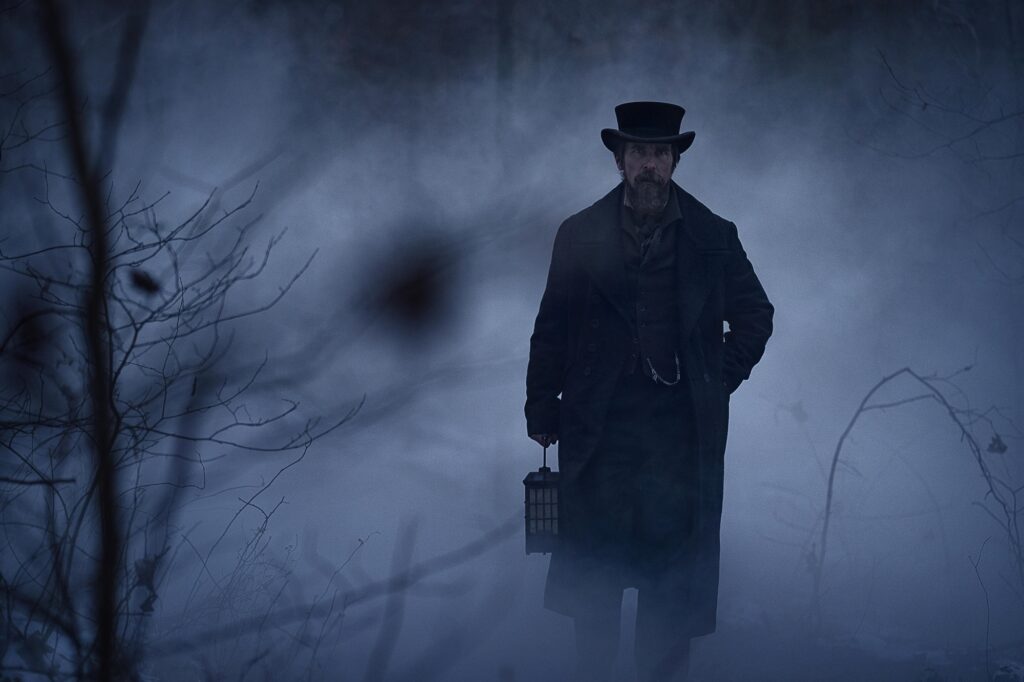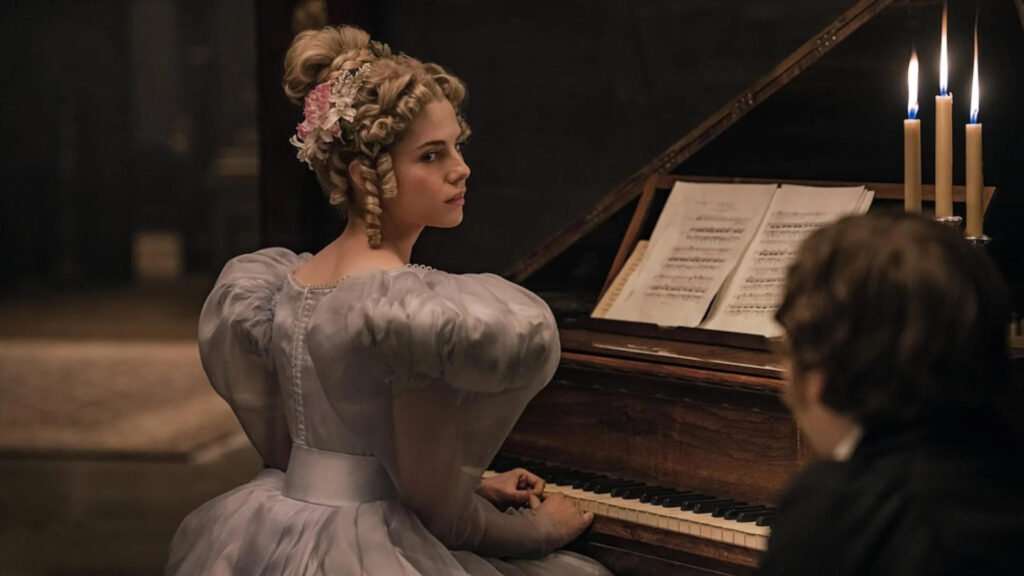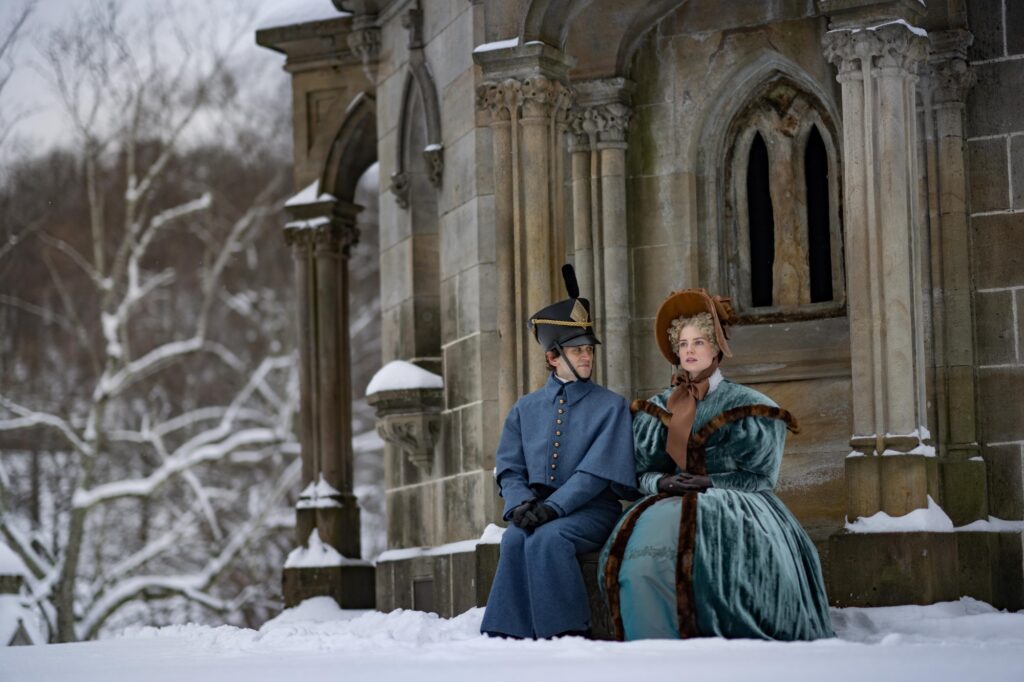“I’ve always loved Gothic horror,” confesses The Pale Blue Eye star Lucy Boynton. The Murder on the Orient Express and Bohemian Rhapsody actress stars in the Scott Cooper-directed mystery drama opposite Christian Bale and Harry Melling, about a series of occult murders at West Point Military Academy in 1830.
Based on the bestselling novel by Louis Bayard, The Pale Blue Eye opens on death: in the early hours of a grey winter morning, a cadet is found hanging. But after the body arrives at the morgue, tragedy becomes savagery when it’s discovered that the young man’s heart has been skilfully cut out. Fearing irreparable damage to the fledgling military academy’s reputation, its leaders turn to a local detective, Augustus Landor (Bale), to solve the murder quickly and discretely. Stymied by the cadets’ code of silence, Landor enlists the help of one of their own to pursue the case, an eccentric cadet with a disdain for the rigors of the military and a penchant for poetry – a young man named Edgar Allan Poe (Melling).
*Mild spoilers below*

Outtake spoke with Boynton to discuss her long-held love of the Gothic horror genre and her role as Lea Marquis, a young woman suffering from seizures who turns to dark sorcery for a cure.
Upon reading the script for the first time, what went through your mind?
Lucy Boynton: I’m pretty sure I thought it was too good to be true. I love this genre so much, and I love the Gothic horror world. But I don’t know how commercial that is and so, for someone like Scott Cooper and Christian Bale to take on this material was such a joy! The script and the book both exceeded all my expectations after just reading the premise. And I think it’s so beautiful because it is this Gothic horror story while also being so sensitive in its handling of each character, so there was so much for each actor to do. So yeah, it felt a little bit too good to be true.
And what about the character of Lea specifically?
Lucy Boynton: I love how multifaceted she is. I think in this genre, you’re always much more analytical about the audience’s experience of the film; you’re trying to exert much more control over the way you manoeuvre your character in order to create the experience you want for the audience. It’s really interesting to piece that all together. Scott and I had some really great conversations about trying to create or present all of Lea’s dimensions: being a woman in this era and therefore being perpetually underestimated, having an illness that makes her incredibly frail, and how she detests the fragility that’s projected onto her. So, I was always trying to find ways to show her sense of self and her strength. I think she does have this electricity about her that, when she hones in on you, is incredibly powerful and captivating.
We find out later that her nature and motivations weren’t what they seemed. Yet as you said, when we first meet the character, she is mostly a reflection of how others see her. How do you approach that duality?
Lucy Boynton: She’s very much aware of people’s perceptions of her and what is projected onto her. It’s quite fun playing a character like that because she’s in on the joke, she’s in on the secret. She’s playing the same game everyone else is, you’re just not aware she’s playing it. It’s such a satisfying place of power to operate from. And she, to me, is a very sharp object with a very soft veil over it. There’s that duality of fulfilling her external projection – playing into what her role in society should be – while being aware of this razor-sharpness within her.
There’s also a clear contrast between when she’s with her family versus when she’s just with Poe. I think the two of them see each other very clearly, and she comes to life around him. Getting a script where you get the opportunity to see all these sides of a character was also very satisfying.

The relationship between Lea and Poe is not easily defined, nor is it entirely romantic – what would you say is at the root of that bond?
Lucy Boynton: They both experience such an acute sense of Otherness that they identify in each other immediately. That immediately creates a kind of curiosity in each other and a bond. And then I think that Edgar Allan Poe is an icon of Gothic horror for a reason – he has such a fascination with death but also tremendous respect for it, and she has this illness that causes her to live in this liminal space between life and death. I think she feels understood and seen by him because he’s so aware of the magnitude and weight of death. It’s a common round she doesn’t feel she has with anyone else.
There are also some complicated family dynamics at play. What conversations did you have with Gillian Anderson, Toby Jones and Harry Lawtey when constructing those on-screen interactions?
Lucy Boynton: They’re a really strange family. I don’t think it was detailed in the script, but we all arrived on set very aware that we would be a very weirdly tactile family. It was very interesting that everyone picked up on that instinct. They’re incredibly tightly knit because Lea’s illness has both drawn them together and isolated them from others. She and her brother Artemus especially, have become completely interwoven. And it was quite fun exploring that level of intimacy when there was an audience around, when there were guests there. There’s also a certain regality to that family and prestige that allows them to be confident in their interactions – which all results in them being weirdly tactile and intimate with each other but without any self-consciousness. Playing that was fun. I think finding characters that are strange and outlandish in ways that you don’t understand at first is so interesting.
It’s interesting that you point to their lack of self-consciousness in how they appear to others; because of this huge secret they’re hiding, you would expect them to put up more of a façade.
Lucy Boynton: I think everyone is the hero of their own story, so the secrets they’re hiding don’t feel particularly wrong to them because, at the core of it, it is a great deed of saving Lea. That is the driving force keeping them close and keeping them going with such a sense of truth and purpose. They certainly feel righteous in their behaviour.

Lea is portrayed as frail and acutely afraid of how imminent her death is, yet at the same time, the audience learns she had the means to save herself the whole time. How did you balance those contradictory perspectives?
Lucy Boynton: I think that with her, no matter how dire it gets, she’s always so tethered to hope. Otherwise, there wouldn’t be any space for that character. There wouldn’t be any journey for that character to go on because being tied to hope means you’ll go to any lengths to protect yourself and to stay clinging to life. Something Scott and I discussed a lot was what Lea was like before we meet her in the film and before she was ill. I think she’s someone who really loved life, and she’s incredibly intelligent and sharp. To have that threatened and taken away while everyone around you gets to move on with their lives, that’s aggravating and charging in a way that keeps driving her. It didn’t feel contradictory; it felt cohesive. She is her truest self when she is feeling well, and when she starts to decline, then she is fighting against that and refuses to acquiesce to the frailty of her body.
What are your hopes for this film?
Lucy Boynton: I love this genre so much. It gives rise to such fascinating, multifaceted characters. With this film, I just hope that people want to watch it twice. The first time we watch it is a completely different experience from the second time, I think.
The Pale Blue Eye releases to Netflix from January 6th.
